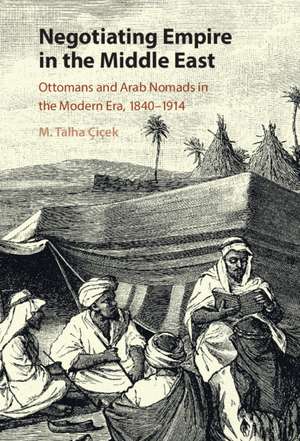Negotiating Empire in the Middle East: Ottomans and Arab Nomads in the Modern Era, 1840–1914
Autor M. Talha Çiçeken Limba Engleză Paperback – 22 mar 2023
| Toate formatele și edițiile | Preț | Express |
|---|---|---|
| Paperback (1) | 177.47 lei 43-57 zile | |
| Cambridge University Press – 22 mar 2023 | 177.47 lei 43-57 zile | |
| Hardback (1) | 584.04 lei 43-57 zile | |
| Cambridge University Press – 14 iul 2021 | 584.04 lei 43-57 zile |
Preț: 177.47 lei
Nou
Puncte Express: 266
Preț estimativ în valută:
33.96€ • 35.55$ • 28.10£
33.96€ • 35.55$ • 28.10£
Carte tipărită la comandă
Livrare economică 07-21 aprilie
Preluare comenzi: 021 569.72.76
Specificații
ISBN-13: 9781108995382
ISBN-10: 1108995381
Pagini: 294
Dimensiuni: 152 x 229 x 16 mm
Greutate: 0.4 kg
Editura: Cambridge University Press
Colecția Cambridge University Press
Locul publicării:Cambridge, United Kingdom
ISBN-10: 1108995381
Pagini: 294
Dimensiuni: 152 x 229 x 16 mm
Greutate: 0.4 kg
Editura: Cambridge University Press
Colecția Cambridge University Press
Locul publicării:Cambridge, United Kingdom
Cuprins
Introduction; 1. Conflict: The Imperial Attempts to Terminate the Nomadic Domination in the Arab Countryside and the Tribal Response; 2. Reinforcement: Land Settlements and Military Fortification in the Desert and Its Frontiers, 1840–1870; 3. Expansion, Reaction, and Reconciliation I: Establishment of the Deir al-Zor Mutasarrıfate and the Reconciliation with the Fid'an and Deir al-Zor's Shammar; 4. Expansion, Reaction and Reconciliation II-The Nomads and Extension of the Ottoman Administration into the South of Syria; 5. Partnership, Provincialization and Conflict: The Shammar in the Provinces of Mosul, Baghdad and Deir al-Zor, 1870–1914; 6. Taxation: The Collection of the Shammar and Anizah Duties; 7. Justice: The Imperial Legal System and the Bedouin Disputes; Conclusion.
Recenzii
'It is usually assumed that the relations of nomads and the Ottoman state were a one-way street: the state ordered and the tribes revolted or obeyed. Talha Çiçek's book shows us that the reality was much more ambivalent and interesting. This book is a pioneering exposition of a fascinating and complicated relationship between the Ottoman state and the Arab nomads in the 19th century.' Selim Deringil, Lebanese American University
'Çiçek's fine study of the relations between the Ottoman government and major Arab nomadic groups lies at the cross-section of two booming fields: historical work on Bedouins and theoretical debates imperial centers and peripheries. Set in a wider comparative perspective and tapping into unused archival records, Çiçek offers important new perspectives.' Ulrike Freitag, Leibniz-Zentrum Moderner Orient
'This exemplary study based on impeccable archival research and exhaustive grasp of historical developments provides a fresh perspective on post-Tanzimat Ottoman policies regarding Arab nomads. It successfully demonstrates that the Ottoman center adopted a flexible and negotiable policy instead of a rigid principle with only one means of implementation vis-à-vis its tribal populations.' M. Şükrü Hanioğlu, Princeton University
'… a welcome addition to several overlapping empirical and theoretical fields … Highly recommended.' R. A. Miller, Choice Connect
'Çiçek's fine study of the relations between the Ottoman government and major Arab nomadic groups lies at the cross-section of two booming fields: historical work on Bedouins and theoretical debates imperial centers and peripheries. Set in a wider comparative perspective and tapping into unused archival records, Çiçek offers important new perspectives.' Ulrike Freitag, Leibniz-Zentrum Moderner Orient
'This exemplary study based on impeccable archival research and exhaustive grasp of historical developments provides a fresh perspective on post-Tanzimat Ottoman policies regarding Arab nomads. It successfully demonstrates that the Ottoman center adopted a flexible and negotiable policy instead of a rigid principle with only one means of implementation vis-à-vis its tribal populations.' M. Şükrü Hanioğlu, Princeton University
'… a welcome addition to several overlapping empirical and theoretical fields … Highly recommended.' R. A. Miller, Choice Connect
Notă biografică
Descriere
Examines how negotiations between the Ottomans and Arab nomads played a part in the making of the modern Middle East.
